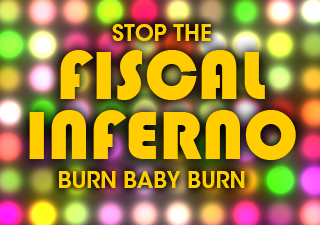Commentary

Fireproofing Pennsylvania’s Economy
What if someone showed you the future and you saw your house was going to catch fire? Wouldn’t you do everything you could to fireproof it today?
It doesn’t take a crystal ball to see that without swift action Pennsylvania’s fiscal house will soon burst into flames. State lawmakers have adequate warning about the threats to our economy, but business as usual will leave taxpayers and future generations with a four-alarm inferno.
For 40 consecutive years, total state spending increased in Pennsylvania. Regardless of the economy, taxpayers’ income and Democrat or Republican control, spending increased each and every year. Until 2011, that is. For the first time in memory, state government actually shrank last year.
The overspending of decades gone by has resulted in a sharp increase in Pennsylvania taxes. Today, Keystone State families pay more than $4,000 per person in state and local taxes, the 10th highest tax burden in the country. The effect: Pennsylvania ranks near the bottom in job, income and population growth over the past 20 years.
Despite decreasing the size of state government, lawmakers passed a state general fund budget last year that spent half a billion dollars more than expected revenues, using reserve funds to balance the books. On top of that, tax collections are behind the pace: Through January, revenues are almost $500 million short of projections.
Believe it or not, that billion-dollar hole is a minor threat compared to the four-alarm fire facing Pennsylvania. While economic growth forecasts are modest, there is no way to avoid dramatic increases in debt and pension payments, and corrections and welfare spending will automatically rise absent significant reforms.
Total state debt has nearly doubled since 2002, and required interest payments will continue to take a higher share of the state budget. Mandatory contributions for state and public school employees will almost quadruple over the next four years and continue to grow significantly for decades.
Moreover, Department of Corrections spending grew 1,700 percent over the past three decades, fueled by a 500 percent increase in the number of prisoners. Gov. Corbett’s budget begins the systemic reform needed to slow that trend.
Public Welfare, the largest department in the budget, has grown at triple the rate of all other spending, and will continue to do so unless we chart a new course. Despite that growth, the poverty rate has risen.
These four alarms serve as a wake-up call to anyone thinking we can ignore the sirens and sleep through another budget as usual.
Astonishingly, there are those who believe we can fix everything with higher taxes. They will use words like “fair share” when what they really mean is “more” — more from taxpayers, families, businesses and entrepreneurs. And mostly, more money for them and other special interests that feed off government. But we must avoid the mistakes of the past, lest the brush fires of poor policies grow into raging fire.
Ultimately, 2011 was a change from the norm for multiple reasons. Not only did the state cut spending for the first time in at least four decades, but our economy started to show signs of life. Private sector job growth was the highest since 1999, and manufacturing job growth the highest in more than 20 years.
Lawmakers must build on last year’s success and “fireproof” Pennsylvania’s economy. That means ending the use of debt for corporate welfare and providing retirement benefits for public sector employees that are predictable and affordable. It means welfare programs that encourage self-reliance rather than dependence on government and corrections reforms to reduce costs and reduce crime.
With the four-alarm fire threatening to bankrupt the state, we must rethink all state spending. Lawmakers should strictly cap the growth of future state spending. They should adopt prevailing wage reforms to lower the inflated cost of government construction projects. And lawmakers must embrace school choice, which saves taxpayers up front, saves children from violent and failing schools, and improves educational outcomes, thus saving on future corrections and welfare costs.
By holding the line on spending and taxes, Gov. Corbett’s 2012-13 budget extinguishes the immediate flames of another budget deficit. But lawmakers must go further to fireproof Pennsylvania’s economy, preventing the smoldering embers of fiscal irresponsibility from becoming an inferno that will burn down our fiscal house and leave future generations of Pennsylvanians to build only from our ashes.
# # #
Nathan A. Benefield is director of policy analysis with the Commonwealth Foundation, Pennsylvania’s free-market think tank.